Emerging markets:
Weathering the geopolitical fragmentation storm
By Duncan Mayall
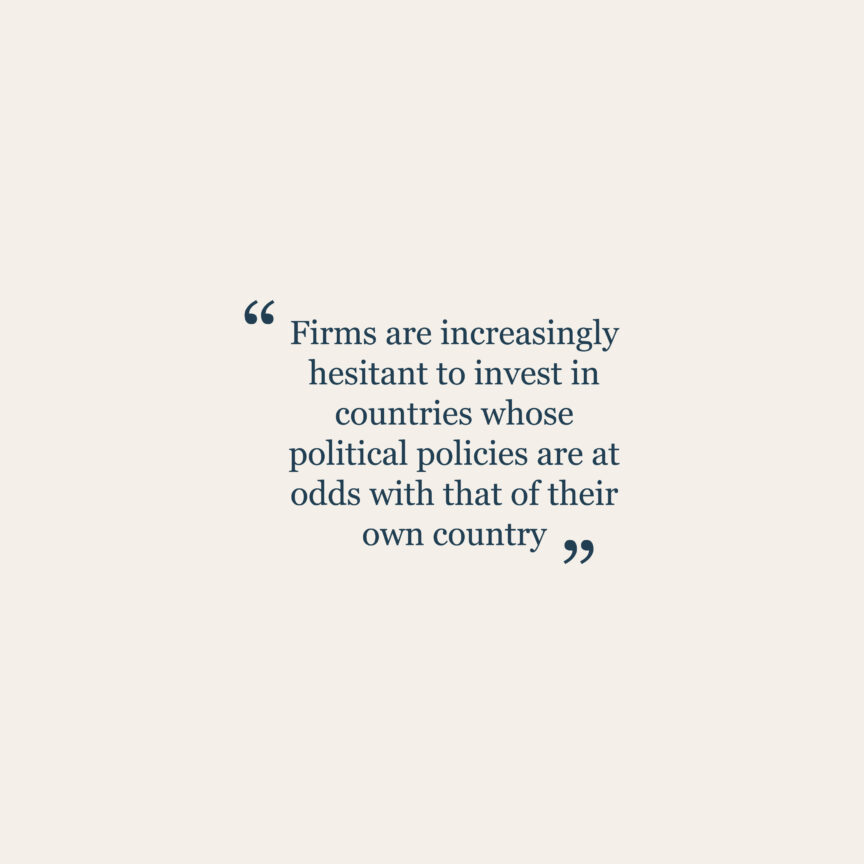
As countries navigate a new era of geopolitical tension and rising protectionism, we explore the implications for emerging market economies, and offer three recommendations for how to respond.
Recently, the global economic conversation has started to move away from an emphasis on free markets, openness, and the influence of international multilateral organisations, towards a higher level of protectionism — and a greater role for industrial policy.
A growing geopolitical shift — in which firms are increasingly hesitant to invest in countries whose political policies are at odds with that of their own country — is becoming a challenge for emerging markets reliant on much needed foreign direct investment (FDI). Considerable time and investment are needed to deal with the impact.
This shift is already beginning to affect FDI flows. Research by the IMF 1 earlier this year found that firms were less likely to invest in countries that had political tension with their “home” markets. This trend, the report suggested, would have an impact on all countries, lowering global GDP by 2%. Unfortunately, poorer countries are likely to be hit hardest as they “are particularly affected by reduced access to investment from advanced economies, due to reduced capital formation and productivity gains from the transfer of better technologies and know-how.”
The pandemic gave rise to a rapid increase in the regulation of investment. While many emerging markets have since escalated their attempts to open up to investment, developed markets have maintained a focus on more restrictive policies, particularly around national security concerns. The United Nations
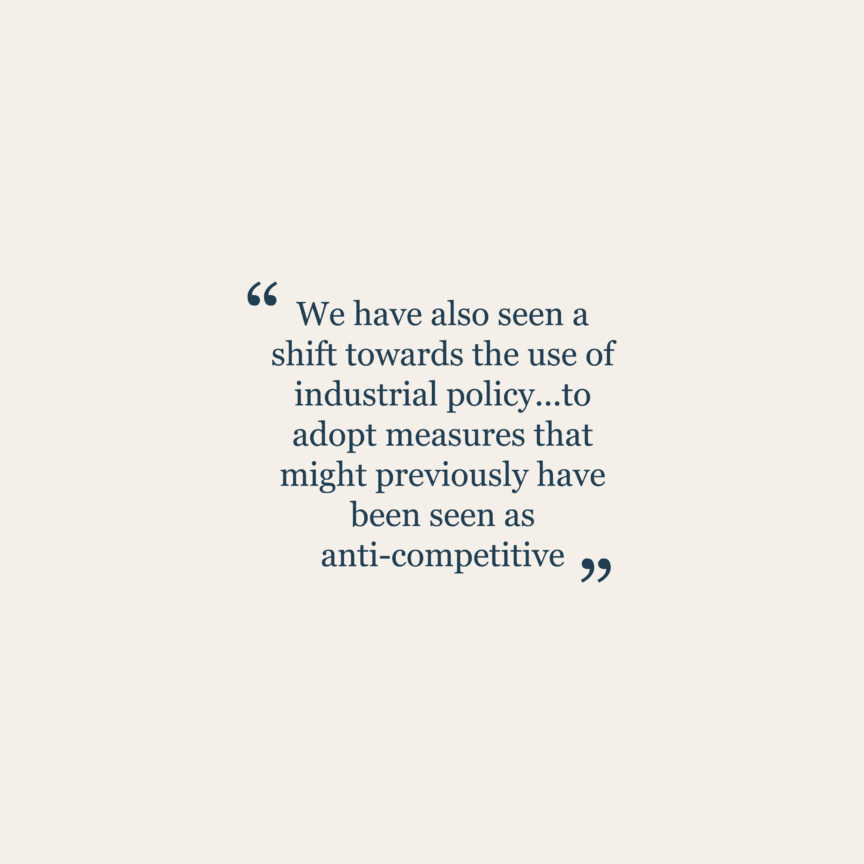
Conference on Trade and Development (UNCTAD) noted that “countries with FDI screening regimes accounted for 68% of FDI stock in 2022,” and that “the number of M&A deals withdrawn because of regulatory or political concerns increased by a third.”
Historically, the focus was on restricting inbound investment, but we are also seeing moves — by both the EU and US — to restrict outbound investment, too. This has attracted concerns 2 from business groups. While these restrictions are being positioned as targeted initiatives, there is clearly a potential for their scope to be widened over time.
Likewise, there has been extensive focus on the security of supply chains, particularly in advanced technology, such as semiconductor chips and rare minerals important to the development of increasingly in-demand batteries and solar power. We have also seen a shift towards the use of industrial policy as a means of boosting key sectors and a greater willingness to adopt measures that might previously have been seen as ineffective or anti-competitive.
Of course, the extent of this shift – and the implications thereof – is yet to be seen. While there has been much discussion of “friend shoring” (manufacturing and sourcing from countries in geopolitical alignment) and delinking supply chains in non-aligned countries, these objectives are difficult to achieve in practice.
What is clear, though, is that the global economic environment is changing at what is a difficult time for FDI in general. Global FDI fell 12% in 2022, according to the UNCTAD World Investment Report. Furthermore, UNCTAD expects downward pressure on global FDI to continue through 2023.
This paper looks at five themes that are shaping the situation emerging markets are now facing, and provides possible solutions for how to start adapting to the new environment.
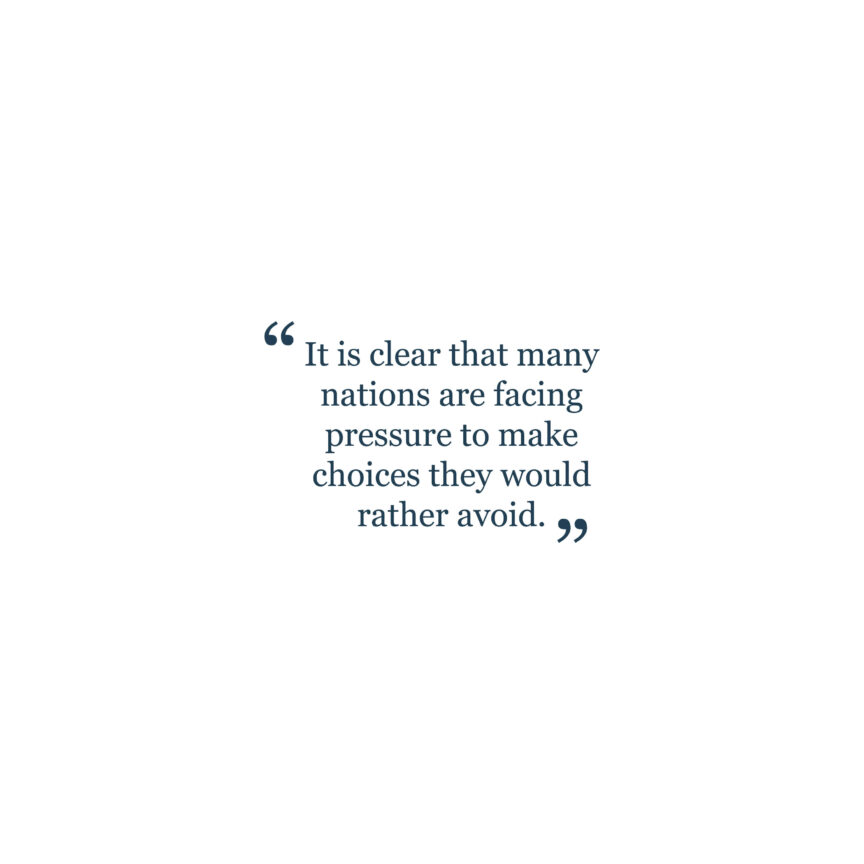
Picking sides in a “new Cold War”
The tensions between China and the West are often referred to as a “new Cold War”. And as in the Cold War in the second half of the 20th Century, there is rising pressure, particularly from the West, for countries to “pick sides”.
Many emerging markets have been trying to avoid this catch-22. The US remains the world’s largest source of FDI by some distance (FDI outflows from the US are more than twice the value of Japan’s, the second largest source). Developed countries are major sources of investment in highly sought after sectors like advanced manufacturing and renewable energy. Yet, at the same time, China has emerged as a key destination for commodities exports, a key financer of infrastructure through the Belt and Road Initiative (aimed at improving infrastructure roughly along the old Silk Road), and an increasingly important source of innovation and technological expertise.
Another point of division, that mirrors Sino-US tensions, is the war in Ukraine, where many developing countries, led by those in the BRICS grouping (Brazil, Russia, India, China, and South Africa), have taken a pro-Russia stance. The US is threatening to respond with economic measures, like removing South Africa’s trade benefits under the African Growth and Opportunities Act (AGOA).
How each country weighs up its options will be different, and informed by more than just economic arguments, but it is clear that many nations are facing pressure to make choices they would rather avoid.

Harnessing opportunities in disruption
Clearly, opportunities created by the geopolitical shifts are not risk free. So far, it has been broadly possible for countries to preserve their ties with the West while enhancing or maintaining cooperation with China and Russia. What is unclear is for how long this will be possible.
While there are undoubtedly risks, some countries may see this fragmentation as an opportunity. To the extent that Western companies look to adjust their operations and supply chains, and lessen their reliance on China, there could be an opportunity for other countries to benefit from this shift.
Likewise, as Chinese investors find it more challenging to make investments in the West due to more restrictive policies on FDI, there is potential for FDI flows to be redirected to other markets.
One key area of risk is in advanced and dual-use technology. As Western companies seek to curb Chinese ability to access certain technologies, countries attempting to steer a middle ground may find themselves shut out. And if fragmentation worsens, it may be that investors come to see “fully aligned” countries as a much safer options and concentrate their efforts there.
However, it is quite possible that many countries may simply conclude that implementing and enforcing these regulations will prove difficult and expensive, and will not extend beyond a few narrowly targeted sectors
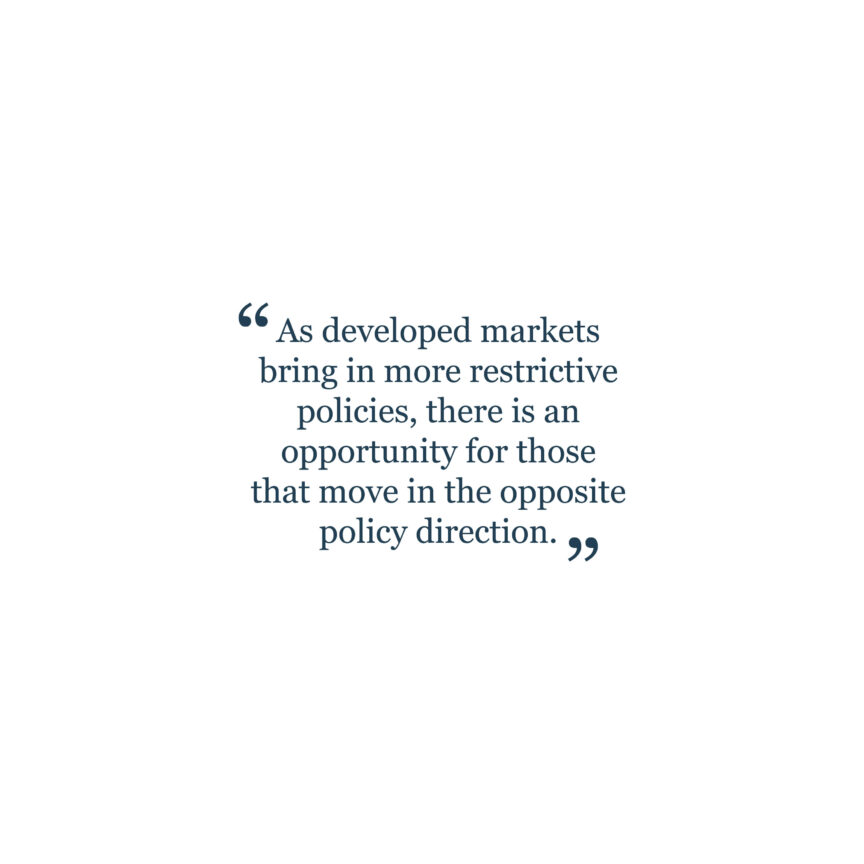
Swimming against the tide a more restrictive environment
As developed markets bring in more restrictive policies and move to industrial policy that may benefit domestic firms over international competitors, there is an opportunity for those that move in the opposite policy direction.
Indeed, analysis from UNCTAD suggests that, among emerging markets, the trend has been towards policies that are favourable to the investment environment.
The rise in the use of industrial policy in the US and Europe has shifted the balance of what makes other developing economies competitive for investment. An easier operating environment on its own may not be able to counteract the impact of significant financial incentive by a firm’s home country, particularly given consumer and state buying power in developed markets.
Likewise, the moves towards a global minimum corporate tax rate, while fitful and uncertain, are beginning to undermine the advantage of a low-tax environment.
However, as a way of standing out from the crowd, smaller economies, focused on reducing their regulatory burden, may emerge as potential winners.
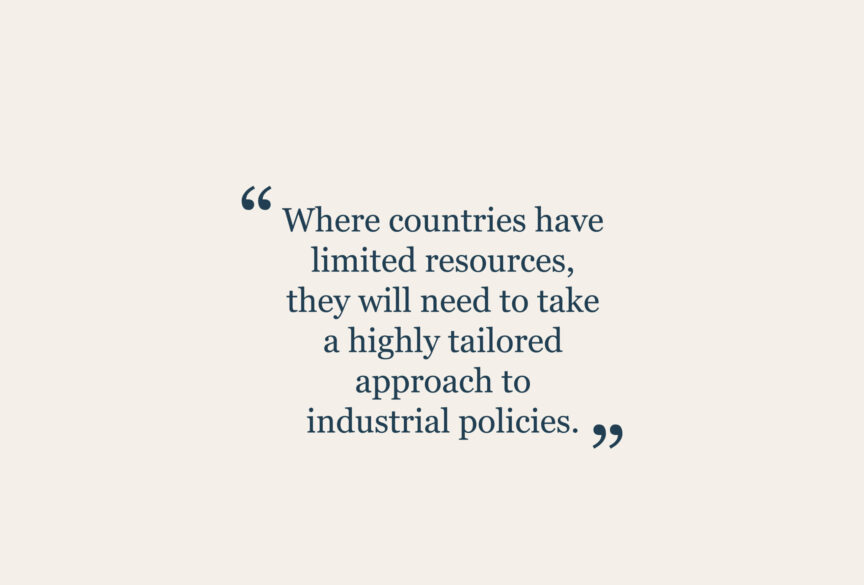
Making a success of industrial policy
When it comes to developing key sectors and attracting investment, industrial policy is becoming an increasingly common part of government toolboxes. The most prominent examples are probably the US’s Inflation Reduction Act (IRA) and the EU’s European Green Deal, both of which promise significant government support as part of efforts to develop elements of the net-zero economy.
In some instances, governments will be well-placed to respond to these threats. Those countries with significant funds to provide financial support to match up with that provided by major economies will be able to punch at their weight. And, in some cases, where state support for the economy is more entrenched, some emerging markets may actually be better placed to develop and implement successful industrial policy because they already have the institutions set up and clear political will to back the policy.
However, for many countries, particularly smaller governments, the challenges may be acute. Where countries have limited resources, they will need to take a highly tailored approach to industrial policies. Emerging markets also face the same problem that all governments face regarding industrial policy, namely, designing it in such a way that it is effective in achieving its goal and does so in a way that represents an efficient use of resources.
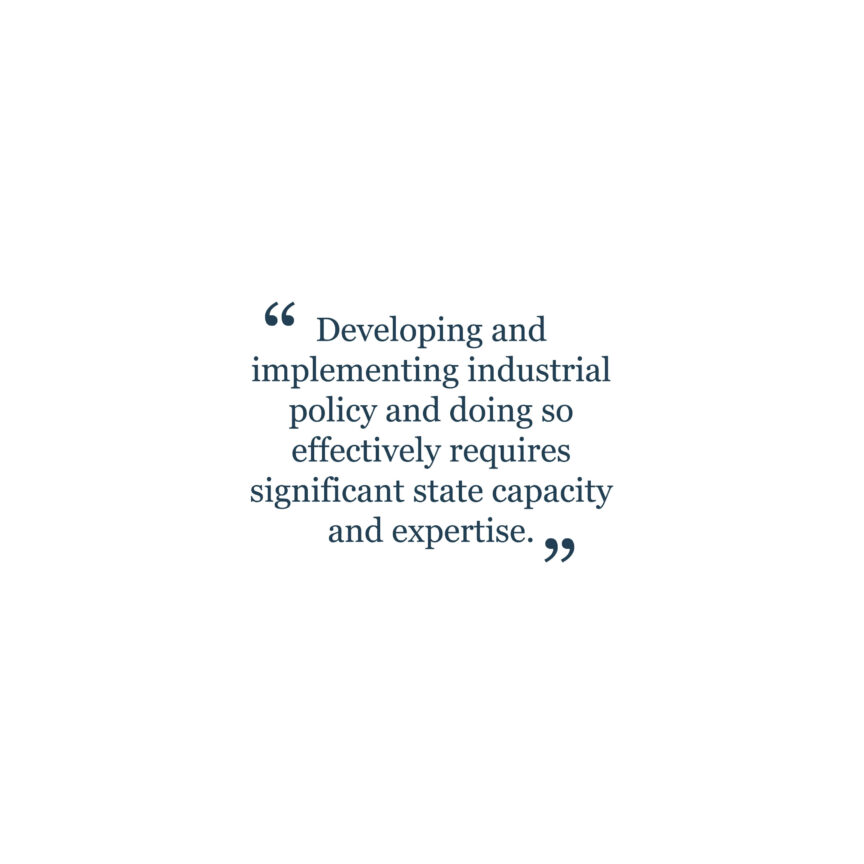
Enhancing state capacity
As a recent United Nations Industrial Development Organization (UNIDO) Policy Brief put it, “high-income countries have the fiscal and administrative capacity to more readily deploy modern industrial policies in ways that may be challenging for lower income countries to emulate.” 3
Developing and implementing industrial policy and doing so effectively requires significant state capacity and expertise. In many emerging markets, this expertise may simply not exist or may not be supported by sufficient capacity.
In order to compete in a global economy where state intervention is increasingly the norm, many emerging markets will need to prioritise developing the ability to do things that they have not done before in order to succeed in protecting and developing the industries that matter to them.
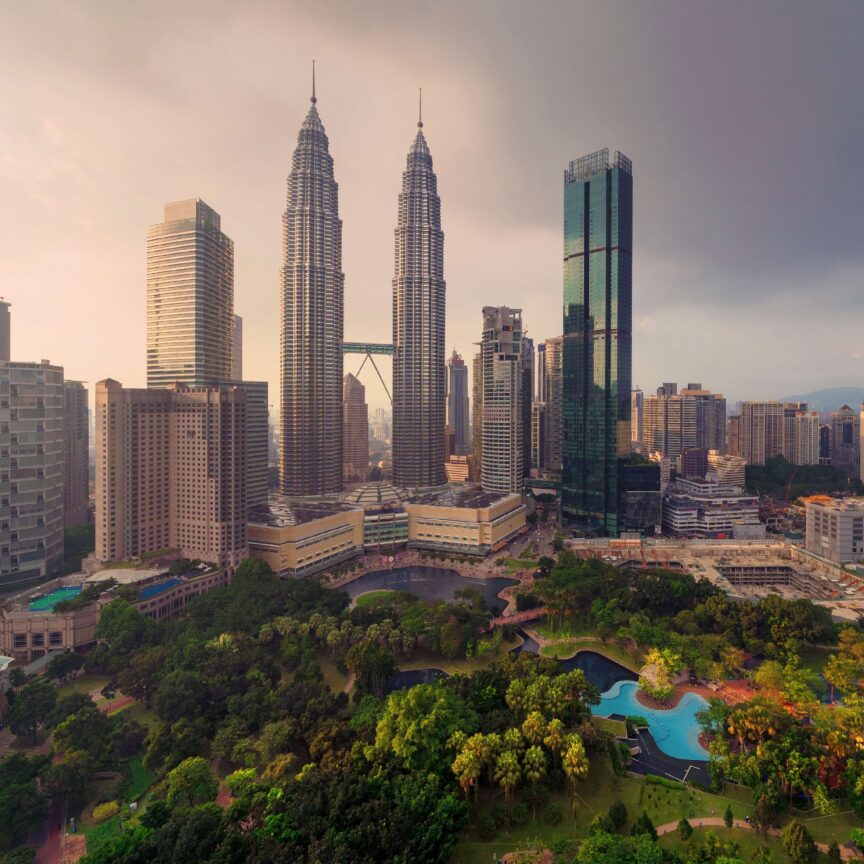
Case study: Malaysia’s success in expanding FDI and challenges around diversification
In terms of headline FDI, 2022 was a highly successful one for Malaysia. In a year where global FDI flows fell 12%, Malaysia saw an increase of nearly 40% to reach $16.9 billion, a record level for the country and putting it among the global top 25.
However, while the value of FDI has increased dramatically there remain concerns regarding the economic impact of these projects and the extent to which they contribute to Malaysia’s ability to drive higher levels of innovation, create skilled job opportunities and enhance productivity in a way that is necessary to enable it to escape the middle-income trap. The majority of FDI (66%) has come in the manufacturing sector, raising questions over how far FDI is contributing to areas such as digitalisation, artificial intelligence and the service industry which Prime Minister Anwar Ibrahim has highlighted as key to long-term growth.4
Furthermore, while the headline FDI flows have increased, that growth has been concentrated within a few key markets, creating concerns around the need for greater diversification. Just four markets (USA, Japan, Singapore and China/Hong Kong) accounted for more than $15 billion in FDI inflows last year, or more than 90% of Malaysia’s total.5
Achieving significant growth in FDI at a highly challenging time for the global economy highlights the country’s potential, but attracting higher-value FDI and diversifying its sources of investment will require Malaysia to develop its profile and networks in new markets and sectors

Case study: Romania’s emergence as a Silicon Valley of Eastern Europe
In the early 2000s, Romania was struggling to develop its economy following the end of the Cold War. And while a long history of investment in engineering had created a potential area of competitive advantage, high personal taxes were seen as a constraint on the potential of the IT sector and contributing to the exodus of skilled labour.
To address this problem, the government introduced a targeted income tax exemption for those in the software industry – highly generous but also with strict eligibility criteria.
The results were impressive. Recent research 6 has shown that not only did “the IT sector [grow] faster in Romania than in otherwise similar countries” after the introduction of the policy, but the policy also had positive knock-on effects elsewhere in the economy as “downstream sectors relying more on IT services also grew faster”.7
The full study is covered in depth here 8 on the excellent Trade Talks podcast.
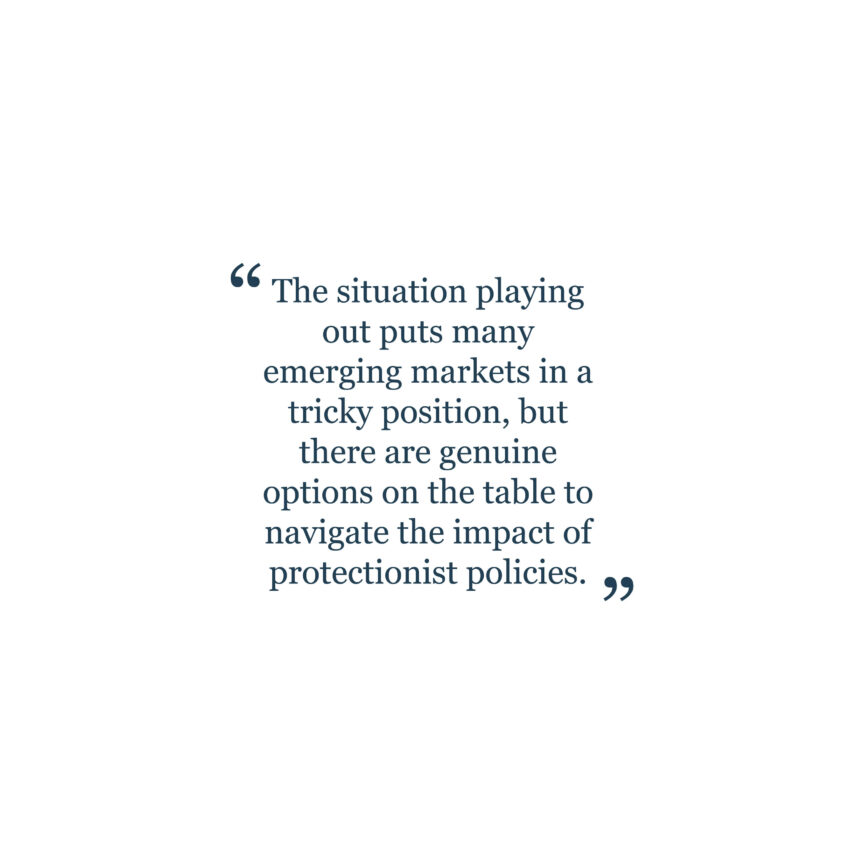
Three recommendations for emerging market countries
Innovation can come from within state structures if creative elements can be freed to experiment. Some years ago, the UK Treasury strategy team allowed for breathing space between high-pressure fiscal events such as budget announcements. This gave time for an unconventional idea to germinate and safe space for it to grow – crucial, given the time-consuming, delicate negotiations that were also required to bring all ministries on board with a novel plan to free up revenue.
The situation playing out puts many emerging markets in a tricky position, but there are genuine options on the table to navigate the impact of protectionist policies.
1. Governments can look to establish closer links between their investment promotion and diplomatic teams.
- Trade, investment, and diplomacy have always been closely linked and strong engagement between the functions continues to be best practice.
- Positive diplomatic relations are an increasingly decisive factor in investors’ decision making, so building and maintaining those relationships with key sources of trade and investment is vital.
- Innovative countries can build strong institutional links between their economic development agencies and their foreign missions.
2. Countries can reassess their competitiveness in a new environment of active industrial policy.
- Those with limited resources to devote to supporting investors will need to be sure they are targeted in the most effective way, and not simply towards the most successful interest groups.
- Those countries which do have more resources available will have to answer the same questions that face any industrial policy: is this support effective? Is it the best use of funds? And is this sector economically viable?
- Developing countries in particular should look at trade integration as way to create larger markets to attract investment.
3. Policy makers should conduct regular audits to monitor and evaluate the risks to investment from their key markets and sectors
- Countries should be reviewing regulatory risk in their key sectors and markets to ascertain to what degree investment in these sectors could be negatively influenced by major players such as the US and EU.
- In a more active regulatory environment, it becomes increasingly important to develop robust responses (the experience of the EU and South Korea in regards to the US’s IRA is a clear example.)9
- In developing these responses, states should seek to prioritise the long-term economic interest of their citizens over historical and ideological solidarity.

About the author
Duncan Mayall
Director, Integrated Government Advisory Practice
Duncan has over 15 years of experience in government and corporate advisory. He specialises in economic analysis and its application to policy and communications, focusing on FDI and sovereign wealth funds.
He has worked on economic communications campaigns for governments, including Bahrain, Saudi Arabia, Iraq, and Morocco. Before this, Duncan worked in financial communications, advising several listed businesses – from FTSE100 to AIM listed companies – and working across various corporate transactions.
References
[1] JaeBin Ahn, Ashique Habib, Davide Malacrino , Andrea F. Presbitero. “Fragmenting Foreign Direct Investment Hits Emerging Economies Hardest Long-term losses of 2 percent of global output due to shifting foreign direct investments underscore why global integration needs robust defense”, IMF Blog, April 5, 2023. LINK
[2] Danielle Myles. “Business groups hit back at EU outbound screening plan”, FDI Intelligence, July 17, 2023. LINK
[3] Juhász, R., Lane, N., Oehlsen, E. and Pérez, V. C. “Global Industrial Policy: Measurement and Results,” Policy Brief Series: Insights on Industrial Development, UNIDO, 2023.
[4] “Anwar faces fight to pull Malaysia out of middle-income trap,” Nikkei Asia, 6 December 2022.
[5] Statistics of Foreign Direct Investment in Malaysia 2022, Department of Statistics Malaysia, June 2023.
[6] [7] Manelici, I. and Pantea, S. “Industrial Policy at Work: Evidence from Romania’s Income Tax Break for Workers in IT,” European Economic Review, 16 February 2021.
[8] “Industrial policy and the rise of Romania’s Silicon Valley”, Trade Talks Podcast, July 9, 2023 LINK
[9] János Allenbach-Ammann. “Korean trade minister calls for cooperation with EU against US subsidy bill”, Euractiv, Dec 12, 2022. LINK
